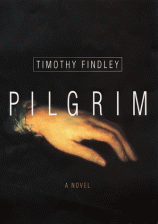Reading Group Guide
Discussion Questions
Pilgrim

1. One of the central questions of Pilgrim is the main character's sanity. Does your opinion change throughout the course of the novel? How does Findley make the reader constantly reevaluate that assessment? By the end do you think Pilgrim is a visionary, or mad? Could he both?
2. What is your interpretation of Pilgrim's journals? Are they actual memories, or a detailed fiction? Do you believe the authenticity of their stories? Why are most of the entries labeled as "dreams"? Is there any common thread between the different people Pilgrim claims to have been? How is the narrative voice of the journals different from the rest of the novel, and what does it reveal about the character of its author?
3. What is Sybil Quartermaine's relationship to Pilgrim? Is she insane? How was the attractive couple at the hotel Baur au Lac involved in her death? What does she mean by her parting words, "In the wilderness, I found an altar with this inscription: TO THE UNKNOWN GOD... And I have made my sacrifice accordingly"?
4. What is the significance of Pilgrim's name? What is his pilgrimage and what does it mean to be a pilgrim? Jung, while reading the journals, is inspired to see his own journey as a pilgrimage: "I shall carry my notebook, of course. And perhaps a staff." What ultimately is Jung's pilgrimage? Does it change through the course of his work with Pilgrim, and does Jung reach his destination?
5. What kind of a husband is Jung? How is the state of his marriage a reflection on the state of his mind, and on his work? Do you agree with Jung when he tells Freud that marriage must allow for polygamous affairs? What is the price he pays for his own affairs? How does Jung repeatedly fail the women in his life: Emma, Sybil, Countess Blavinskeya?
6. Pilgrim bemoans, "I am tired of being captive to the human condition. Of being so endlessly a human being." What aspects of human life does he specifically find wearying? Most people would enjoy living multiple lives. Why do you think Pilgrim does not?
7. Pilgrim coaxes Jung to release an imaginary butterfly out a window, saying, "there it goes... you have set your imagination free at last." Does Pilgrim succeed in opening up Jung's imagination? To what degree does Jung come to believe in Pilgrim and his story, and what prevents him from believing fully? How does Pilgrim and Jung's relationship evolve, and at what point does Pilgrim become the doctor, and Jung, the patient?
8. How is Pilgrim's case an inspiration for Jung's theory of the collective unconscious? What does Jung's theory make of Pilgrim's "memories"? What does his revelation do to his relationship with the rest of the psychoanalytic community? What do you think the difference is between a mental breakdown and a mental discovery?
9. After a traumatic dream of the future, Pilgrim attacks the instruments in the clinic's Music Room, screaming, "damn all music! Damn all art! Damn all beauty! Kill! Kill! Kill!" Why does he have such antipathy toward art? Why does he attempt to burn Chartres? When he steals the Mona Lisa, why does he think, "She is free... I am free. We are free."?
10. Did the inclusion of the Author's Note at the end of the novel affect your appreciation of Findley's book? Were you surprised by the extent of historical realities in the novel? Was it difficult to digest a fictionalized account of real historic figures, or did the fact that many characters actually existed lend the novel a greater impact?
Pilgrim
- Publication Date: December 22, 1999
- Hardcover: 496 pages
- Publisher: Harper
- ISBN-10: 006019197X
- ISBN-13: 9780060191979






